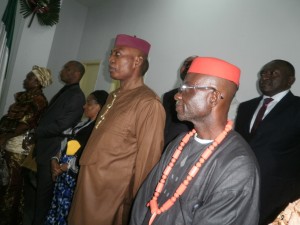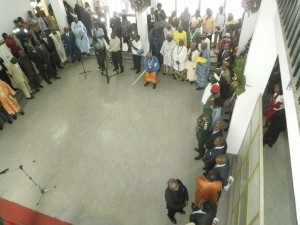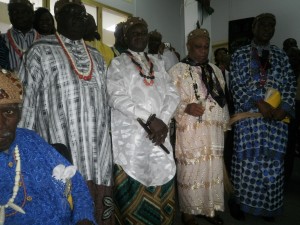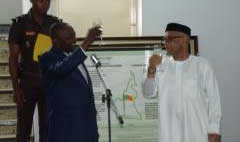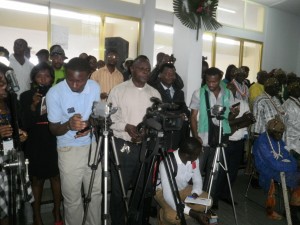Walter Wilson Nana
Buea, Cameroon.
The Bakassi peninsula is now an integral part of Cameroon, following the UN backed transitional period, which officially ended Wednesday, August 14 2013. With the coming into reality of this significant date and event, Cameroon and Nigeria have pledged to continue living in peace and harmony, as the former takes over full control of Bakassi Peninsula.
Senior government officials from both countries took the commitment in Buea Wednesday, August 14, during the official handing over ceremony, presided at by the Governor of the Southwest Region, Bernard Okalia Bilai.
The ceremony brought together top administrative officials, members of the Nigerian Community headed by the Nigerian Consul General for the Southwest and Northwest Regions of Cameroon, His Excellency Mohammed Akan, traditional, religious leaders, a heavy attendance of the press corps and more.
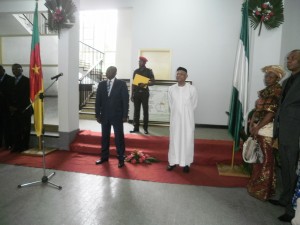
SW Governor, Bernard Okalia and Nigerian consul, Akan celebrate the complete transfer of soveriegnty.
Southwest Regional Governor Okalia Bilai said the handing over ceremony is very significant in the lives of both countries, as it marks the beginning of greater cooperation ties between the two countries. He added; “During the transitional period, relations between Cameroon and Nigeria was convivial, peaceful, show of good neighbourliness and paternity.”
He paid allegiance to the peaceful and diplomatic efforts adopted by President Paul Biya and the then President of Nigeria, Olusegun Obasanjo, in resolving what would have been a bloody conflict between the two brotherly countries.
According to Okalia Bilai, Cameroon and Nigeria, today, stand tall in the eyes of the international community not only as advocates of peace, but also as architects of peace. He implored other countries facing similar boarder misunderstandings to denounce conflicts and seek peaceful resolution just like Cameroon and Nigeria did.
The Southwest Regional boss assured Nigerians residing in Bakassi and other regions in Cameroon that the two countries would continue to live in peace, conviviality and tranquility. This, he said, would go a long way to cement the relationship since nature and God had predestined that the two nations will live as neighbours. “Life will continue to go on as usual in Bakassi, Tiko, Kumba, Douala, Ekok and other towns in Cameroon that we have our brothers and sisters from Nigeria,” he noted.
The Nigerian Diplomat, Akan, lauded the initiative of the two Heads of State to have resolved the boarder crisis peacefully. This peaceful resolution, the Consul said, has shown the weaknesses of conflicts as a solution to problems. “The Green Tree accord came to reinforce the relationship between Cameroon and Nigeria,” he mentioned.
He will add that the Cameroon-Nigeria nonviolence stand has set a new precedence for political leaders, cooperate managers and the globe at large to emulate. “Cameroonians and Nigerians should doff-their-hats to President Biya and former President Olusegun Obasanjo of Nigeria and today, President Goodluck Ebele Jonathan for showing a good example of how to resolve crises,” he said.
Akan thanked the government of Cameroon for the good treatment given to Nigeria citizens residing in Cameroon. “Nigerians are very pleased with such hospitality showed them in Cameroon, and consider the country as their second home,” he said, while making a plea for this peaceful co-existence to continue, especially now that cooperation ties between the two countries have been sealed with the smooth transition of the Bakassi peninsula to Cameroon.
Giving insights on what significance would this handing over ceremony be to both countries, Prof. Victor Julius Ngoh, a Historian and Deputy Vice Chancellor in charge of Research, Cooperation and Relations with the Business World, University of Buea, UB, said the ceremony has given Cameroon absolute sovereignty over Bakassi Peninsula.
The varsity don indicated that the London Agreement of 1913 handed the Bakassi Peninsula and all its resources to Cameroon. But prior to 1913, Bakassi was controlled by the Nigerian government. To him, the London Agreement of 1913 gave rise to the numerous conflicts between Cameroon and Nigeria.
“It was only after the verdict of the International Court of Justice in the Hague, Holland and the Green Tree Accord in New York, USA, signed by President Paul Biya of Cameroon, and former Nigerian President, Olusegun Obasanjo, supervised by former UN Secretary General, Kofi Ata Annan, on June 12, 2006, that Bakassi was handed back to Cameroon, and Wednesday, August 14 2013 marks the end of the transitional period,” Prof. Ngoh stated.
In Yaoundé, Wednesday, August 14 2013, there was also a diplomatic ceremony to commemorate the UN supervised transitional period. Cameroon’s Minister of Foreign Affairs, Pierre Mukoko Mbonjo mentioned that the two countries are celebrating the determination of their leaders to establish peace.
Nigerian High Commissioner to Cameroon, Hadiza Mustapha said she is assured by the assurance from Cameroon that Nigerians must live in peace and rest the laws of Cameroon.
In the city of Douala, which hosts a large community of Nigerians, the Governor of the Littoral Region, Beti Assomo in the company of the Nigerian Consul General for the Littoral and West Regions of Cameroon had a similar cocktail party to celebrate the transition. Both men expounded on the fine relationship existing between their countries.
Before The Bakassi Conflict Erupted
Cameroon and Nigeria, have over the years laid claim over Bakassi Peninsula. This has often given rise to tension between the two countries. The issues degenerated in 1981, when the two countries were at the brink of war over the peninsula. In December 1993, armed confrontation broke out in the peninsula, and the two countries recorded a lot of casualties.
Due to repeated skirmishes between the two nations, Cameroon reported the matter to the International Court of Justice, ICJ, in The Hague, on March 29, 1994.
The case became more complex than thought and required diplomatic exchanges dating back over 100 years to be reviewed. Nigeria relied largely on Anglo-German correspondence of 1885, as well as treaties between the colonial powers and the indigenous rulers in the area, especially the 1884 Treaty of Protection.
Cameroon drew attention to the Anglo-German treaty of 1913, which defined sphere of control in the peninsula, as well as two agreements signed in the 1970s between Cameroon and Nigeria. These were the Yaounde II Declaration of April 4, 1971, and the Maroua Declaration of June 1, 1975, which were devised to outline maritime boundaries between the two countries following their independence. After this maritime demarcation, Bakassi was handed over to Cameroon but Nigeria refused to ratify the agreement.
On October 10, 2002, the ICJ instructed Nigeria to transfer possession of the peninsula, but warned that the inhabitants should not move or change their nationality. Cameroon on the other hand was advised to protect their rights, infrastructure and welfare.
The verdict caused consternation in Nigeria, and on November 22, 2007, the Nigerian Senate passed a resolution declaring that the withdrawal from the Bakassi Peninsula was illegal. But the ICJ backed by the UN were resolute to solve this problem. However, on August 14, 2008, Bakassi was handed over to Cameroon, to be administered on a five year transitional period.
Before the final handing over ceremony, the Cameroon government is reported to have spent over FCFA 20 billion in the peninsula as a prerequisite to assume absolute control. These included building educational, health, security, agricultural and other developmental structures and institutions.
While the court actions at The Hague lasted for 8 years, Cameroon and Nigeria have a border line of 1,500km, one of the longest in the African continent.


